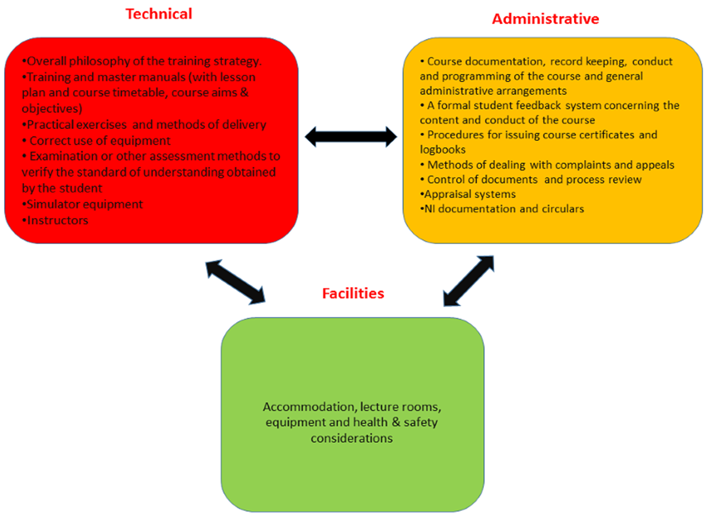What is Accreditation and Standard?
Accreditation is defined by The Nautical Institute as the systematic verification of the processes, procedures, methods and techniques employed to deliver a maritime training product or service in accordance with standards defined, co-developed or approved by The Nautical Institute. A Standard is an approved specification of course content and management control procedures that a provider has to meet. The approver or issuer of a Standard can either be a regulatory body or a recognised subject matter institute.
Why do I need accreditation?
In order to impart DP Courses, a training centre must meet the requirements of the DP Operator Training Scheme Accreditation Standards which is set up by the Nautical Institute. They need to be audited and accredited by the Nautical Institute. The Nautical Institute DP Operator training scheme is the industry-recognised learning route to becoming a qualified Dynamic Positioning Operator (DPO). It is a not-for-profit scheme administered by The Nautical Institute - a Registered Charity (No.1002462). The Nautical Institute has managed the scheme since its inception in the mid 1980’s and in conjunction with the industry has developed the certification criteria. It administers the certification of DPO’s together with the accreditation of the training providers.
How do I apply?
To apply for Nautical Institute accreditation, please get in touch with the Qualifications Marine & Offshore Accreditations Department at: accreditations@nautinst.org.
The Nautical Institute will then guide you through the application process, including the preparation for an NI Audit.The accreditation standard can be downloaded from here
How much does it cost?
- Audit Days: 2 Auditors for two days (IF additional audit required for STR, Shuttle Tanker, Revalidation or Oil Spill Response Courses, additional audit days at rates specified will apply).
- Travel Days: 2 Auditors for total amount of travel time.
- Pre-audit check of documents and post-audit reporting, half day each by each auditor, totalling 2 days
- Travel costs, (taxi/flights etc.)
- Hotel costs (and meals as required).
- Others, as required.
- Annual DPTEG Fees £1850, payable at time of audit, pro-rated if applicable.
Daily rate: From 1 January 2025 the date rate service charge by The Nautical Institute is £1132.00(including management fee) per man day.
What are the benefits of accreditation?
An accredited DP Training Centre will be able contribute to the DP Industry by offering suitable courses to aspiring DPOs. As an approved Centre, it can hold DP Courses such as Induction, Simulator and Sea Time Reduction, DP Revalidation, DP Refresher and Competency Assessment and DP Vessel Maintainer Course. The DPOs passing the courses will be recognised by all Owners and Charterers in the ever expanding DP industry.
- Industry Recognition: Accredited training centres gain significant industry recognition. DPOs certified by accredited centres are highly regarded by ship owners, charterers, and employers worldwide.
- Enhanced Credibility: Accreditation demonstrates a commitment to high-quality training and adherence to industry best practices. This enhances the credibility and reputation of the training centre within the maritime industry.
- Expanded Course Offerings: Accredited centres can offer a broader range of DP courses, including Induction, Simulator, Sea Time Reduction, DP Revalidation, Refresher, Competency Assessment, and DP Vessel Maintainer courses.
- Competitive Advantage: Accreditation provides a competitive advantage in the training market, attracting a larger pool of potential students. This also facilitates participation in prestigious industry events such as NI RPT meetings and DP Conferences.
- Improved Safety and Efficiency: By ensuring high training standards, accreditation contributes to improved safety and efficiency in DP operations across the industry
What is the validity period after an audit?
The accreditation validity is for three years after which the centre will need to be re-accredited.
What evidence do I need to prepare?
During the audit, the NI will look at a prospective trainer’s competency and subject knowledge, the course’s technical content, and the provider’s administration and training policies. . Full details of the requirements will be made available.
How many Centres are accredited at the moment?
There are currently 83 accredited DP training centres worldwide.
What are the main difficulties to get a new accreditation set up?
Two primary challenges often arise during the accreditation process:
- Inadequate Focus on Teaching Methodology: Many training centres prioritize simulator requirements while neglecting the establishment of robust teaching methodologies. This can lead to accreditation refusals due to insufficiently developed course material and ineffective teaching approaches, ultimately impacting the quality of student learning.
- Insufficient Instructor Training: Meeting the stringent requirements for instructor initial training poses another significant challenge. The Nautical Institute mandates a minimum of 5 weeks of training with an approved senior instructor from an NI-accredited training centre. Ensuring all instructors meet this rigorous standard can be demanding for training providers.
How the Nautical Institute assesses the Training centres?
The Nautical Institute employs a tiered assessment system during the accreditation process:
- Technical Requirements: These are considered critical and carry the most weight. Ensuring the technical content of the training program, including course materials, simulator capabilities, and instructor expertise, meets the highest industry standards.
- Administrative Requirements:
- Emphasis: A robust and well-documented administrative system is crucial. This includes effective record-keeping, quality control procedures, and a clear understanding of regulatory compliance.
- Facilities: While generally considered less critical, adequate facilities are essential for a conducive learning environment.
- H&S: Ensuring the training centre provides a safe and comfortable learning environment with appropriate lecture rooms and adequate facilities for student learning.
The accreditation standard provides detailed guidance on each of these areas. The Nautical Institute utilises a traffic light system to highlight areas of strength, areas requiring improvement, and any critical non-conformances.
By carefully addressing these key areas and demonstrating a commitment to continuous improvement, training centres can successfully navigate the accreditation process and achieve the highest standards of excellence in Dynamic Positioning training.



